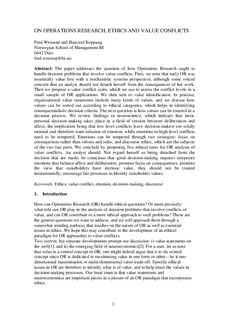On Operations Research, Ethics and Value Conflicts
Abstract
The paper addresses the question of how Operations Research ought to handle decision problems that involve value conflicts. First, we note that early OR was essentially value free with a mechanistic systems perspective, although some voiced concern that an analyst should not detach herself from the consequences of her work. Then we propose a value conflict scale, which we use to assess the conflict levels in a small sample of OR applications. We then turn to value identification. In practise, organizational value statements include many kinds of values, and we discuss how values can be sorted out according to ethical categories, which helps in identifying consequentialistic decision criteria. The next question is how values can be enacted in a decision process. We review findings in neuroscience, which indicate that intra-personal decision-making takes place in a field of tension between deliberation and affect, the implication being that low level conflicts leave decision-makers too coldly rational and therefore want infusion of emotion, while emotions in high-level conflicts need to be tempered. Emotions can be tempered through two strategies: focus on consequences rather than virtues and rules, and discourse ethics, which are the subjects of the two last parts. We conclude by proposing five ethical rules for OR analysis of value conflicts. An analyst should: Not regard herself as being detached from the decision that are made; be conscious that good decision-making requires temperate emotions that balance affect and deliberation; promote focus on consequences; promote the view that stakeholders have intrinsic value, they should not be treated instrumentally; encourage fair processes to identify stakeholder values.
Description
A post-print of an article originally published in Omega, vol 37 (6), 2009.
